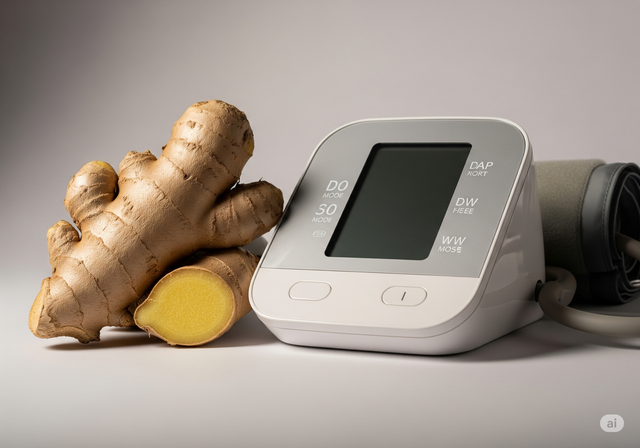Recently, recent studies have also shown that ginger may benefit heart health.
With high levels of natural compounds, ginger also helps lower blood pressure, improve blood lipids, fight inflammation, prevent atherosclerosis and support blood sugar control, according to Verywell Health .
Ginger helps lower blood pressure
Regular use of ginger can help reduce systolic blood pressure. This is a very important indicator, because high systolic blood pressure puts pressure on the heart and blood vessels, increasing the risk of heart disease and stroke in the long term.
Liz Weinandy, a nutritionist at the Wexner Medical Center, Ohio State University (USA), said that some compounds in ginger have a similar mechanism to calcium channel blockers, helping blood vessels dilate and slow the heart rate, thereby supporting natural blood pressure reduction.

Regular use of ginger can help reduce systolic blood pressure.
Illustration: AI
Improve cholesterol and triglycerides
In addition to its effects on blood pressure, ginger also helps improve blood lipid levels. Regular use of ginger has been shown to reduce LDL cholesterol and triglycerides, two harmful fats that can build up in artery walls. When these levels are reduced, the risk of blood vessel blockage and cardiovascular disease is also reduced.
Ms. Lindsay Malone, a nutritionist at Case Western Reserve School of Medicine (USA), analyzed that the active ingredients in ginger have the ability to inhibit cholesterol synthesis in the liver, while increasing bile acid secretion and stimulating fat-degrading enzymes, thereby helping to comprehensively improve blood lipid indexes.
Helps fight inflammation
Chronic inflammation is a major cause of heart disease. Ginger contains phenolic compounds such as gingerol, shogaol, and paradol, which have anti-inflammatory effects.
According to Liz Weinandy, the plant compounds in ginger also help boost the immune system, control bacteria and viruses, and neutralize free radicals, thereby preventing cell damage.
Protect the body from atherosclerosis
Not only that, ginger also has antioxidant properties, helping to protect heart cells and blood vessels from free radical attack.
This effect helps prevent atherosclerosis, a condition in which plaque builds up in the arteries, obstructing blood flow and increasing the risk of heart attack, stroke or heart failure.
Therefore, regular ginger supplementation is considered an effective cardiovascular support measure.
Support blood sugar control
In addition to the above benefits, ginger is also considered a companion of people with type 2 diabetes.
The compound 6-gingerol in ginger has the ability to promote the transport of sugar from the blood into muscle cells, thereby lowering blood sugar and improving insulin sensitivity.
Ginger also helps reduce insulin resistance, a major risk factor for heart disease.
Despite its many benefits, ginger is not a substitute for a healthy lifestyle. Nyree Dardarian, a nutritionist at Drexel University (USA), emphasizes that ginger works best when used in combination with a balanced diet, regular exercise, and maintaining healthy lifestyle habits.
Source: https://thanhnien.vn/dieu-gi-xay-ra-voi-huyet-ap-va-cholesterol-khi-ban-them-gung-vao-che-do-an-185250820100424538.htm







![[Photo] General Secretary To Lam attends the 80th Anniversary of the Cultural Sector's Traditional Day](https://vphoto.vietnam.vn/thumb/1200x675/vietnam/resource/IMAGE/2025/8/23/7a88e6b58502490aa153adf8f0eec2b2)




























































































Comment (0)